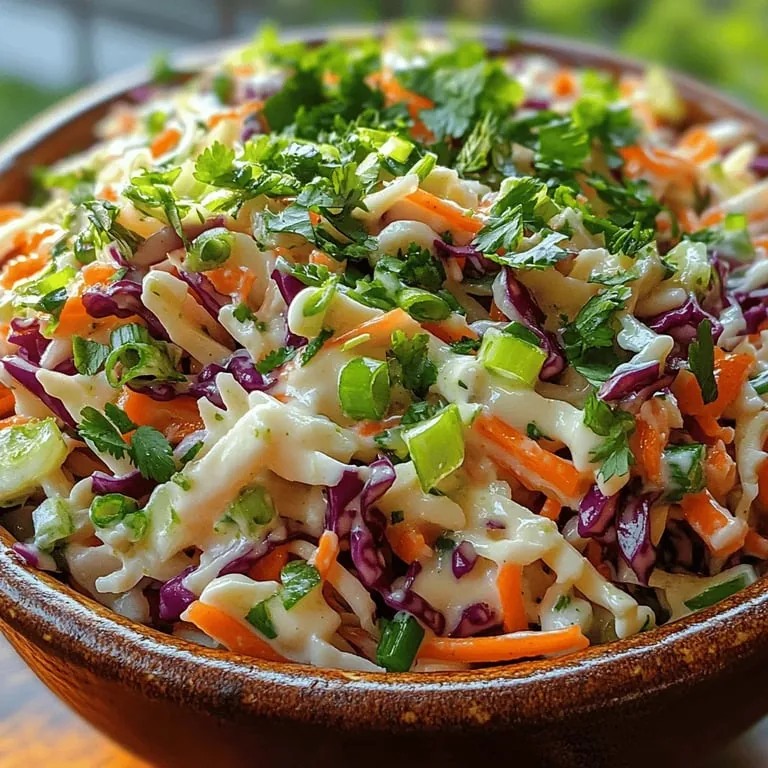Imagine a side dish that sings with the bright tang of lime, the herbaceous pop of cilantro, and the satisfying crunch of fresh cabbage—all while staying light enough for any diet. That’s the magic of Vibrant Cilantro Lime Coleslaw, a salad that feels festive yet comforting.
What makes this coleslaw truly special is the balance between creamy avocado‑lime dressing and the natural snap of shredded vegetables. The dressing coats each strand without drowning it, delivering a silky texture that clings perfectly to every bite.
This dish will win over health‑conscious eaters, grill‑masters looking for a fresh topping, and anyone craving a colorful, nutrient‑dense side. Serve it at backyard barbecues, taco nights, or as a crisp accompaniment to a hearty bowl of soup.
Preparing the coleslaw is straightforward: shred the veggies, whisk together a zingy lime‑avocado dressing, toss everything together, and let the flavors meld for a few minutes before serving. The result is a salad that’s ready in under half an hour.
Why You'll Love This Recipe
Bright, Zesty Flavor: The lime juice and cilantro create a fresh, citrus‑forward profile that awakens the palate and pairs beautifully with richer mains.
Nutritious & Low‑Calorie: Packed with fiber‑rich cabbage, vitamin‑laden carrots, and heart‑healthy avocado, this coleslaw delivers nutrients without excess calories.
Quick & Easy Prep: No cooking required—just shred, whisk, toss, and you have a vibrant side in under 20 minutes, perfect for busy weeknights.
Customizable Texture: Adjust the crunch by mixing different cabbage varieties or adding thinly sliced bell peppers, letting you tailor the bite to your liking.
Ingredients
The foundation of this coleslaw is a mix of crisp, colorful vegetables that provide texture and natural sweetness. Fresh cilantro adds an unmistakable herbaceous note, while ripe avocado supplies a buttery richness that carries the lime‑infused dressing. The dressing itself is a harmonious blend of citrus, healthy fats, and a touch of honey for balanced acidity and subtle sweetness. Together, these components create a side that is both satisfying and nutritionally robust.
Main Ingredients
- 4 cups shredded green cabbage
- 2 cups shredded red cabbage
- 1 cup grated carrots
- ½ cup thinly sliced red onion
Dressing
- 1 large ripe avocado, pitted and mashed
- ¼ cup freshly squeezed lime juice (about 2 limes)
- 2 tablespoons extra‑virgin olive oil
- 1 tablespoon honey or agave nectar
Seasonings & Extras
- ¼ cup chopped fresh cilantro leaves
- ½ teaspoon sea salt (adjust to taste)
- ¼ teaspoon freshly ground black pepper
- Optional: ¼ teaspoon red‑pepper flakes for heat
Each ingredient plays a specific role: the cabbage and carrots provide crunch and natural sweetness; the avocado creates a velvety base that carries lime’s acidity; olive oil adds a smooth mouthfeel, while honey balances the tang. Cilantro injects a fresh, almost citrusy aroma, and the seasonings bring depth without overwhelming the delicate flavors. This thoughtful combination results in a coleslaw that’s bright, creamy, and irresistibly crunchy.
Step-by-Step Instructions

Preparing the Vegetables
Begin by gathering all your produce. Using a sharp knife or a mandoline, shred the green and red cabbage into thin ribbons, grate the carrots, and slice the red onion as finely as possible. Toss the shredded mix in a large bowl, then sprinkle a pinch of salt and let it sit for five minutes; this draws out excess moisture, ensuring the final coleslaw stays crisp rather than soggy.
Making the Lime‑Avocado Dressing
While the vegetables rest, place the ripe avocado in a food processor or a sturdy bowl. Add lime juice, olive oil, honey, and a generous pinch of sea salt. Blend until smooth, scraping the sides as needed. The lime’s acidity not only brightens the flavor but also prevents the avocado from oxidizing, keeping the dressing vibrant green.
Combining Everything
- Dress the Cabbage. Drain any liquid released by the salted cabbage, then pour the avocado‑lime dressing over the vegetables. Toss gently with clean hands or silicone spatulas until every strand is evenly coated. The creamy dressing should cling without pooling at the bottom.
- Incorporate Fresh Herbs. Sprinkle the chopped cilantro over the dressed coleslaw and give it one last quick toss. The cilantro’s bright, slightly peppery notes lift the entire dish, making the flavors pop.
- Season to Taste. Add freshly ground black pepper and, if you enjoy a subtle heat, the optional red‑pepper flakes. Taste and adjust the salt or lime juice as needed—remember, the flavors will mellow slightly as the coleslaw rests.
- Rest Before Serving. Allow the coleslaw to sit at room temperature for 10–15 minutes. This short resting period lets the dressing meld with the vegetables, enhancing the overall harmony of textures and flavors.
Final Presentation
Transfer the coleslaw to a serving bowl, garnish with a few extra cilantro leaves for color, and serve immediately. The dish is best enjoyed fresh, but a brief chill in the refrigerator (no more than 30 minutes) can add a pleasant crispness for hot weather gatherings.
Tips & Tricks
Perfecting the Recipe
Dry the Cabbage Thoroughly: After salting, pat the cabbage with a clean kitchen towel. Removing excess water prevents a soggy coleslaw and keeps the crunch intact.
Use Ripe Avocado: A perfectly ripe avocado yields a smooth dressing without lumps. If the avocado is slightly underripe, add an extra teaspoon of olive oil to achieve the right consistency.
Flavor Enhancements
For an extra burst of brightness, zest a half lime into the dressing before blending. A splash of apple cider vinegar adds a gentle tang that deepens the flavor profile without overpowering the cilantro.
Common Mistakes to Avoid
Avoid over‑mixing once the dressing is added; vigorous stirring can bruise the cabbage, leading to a mushy texture. Also, don’t let the coleslaw sit for more than an hour before serving, as the avocado may oxidize and turn brown.
Pro Tips
Chill the Bowl: Place the mixing bowl in the freezer for 5 minutes before tossing the salad. A cold surface helps keep the vegetables crisp during the mixing process.
Add a Crunch Boost: Toss in a handful of toasted pepitas or sliced almonds just before serving for an added layer of texture and a nutty flavor.
Balance Sweetness: If the lime is particularly tart, increase the honey by a teaspoon. Conversely, reduce honey when using a sweeter variety of lime.
Use a Food‑Processor for Dressing: A quick pulse ensures a perfectly emulsified sauce, eliminating any grainy avocado pieces and creating a silky finish.
Variations
Ingredient Swaps
Swap the red cabbage for shredded purple kale for an earthier bite, or replace carrots with julienned jicama for extra crunch. If avocado isn’t your favorite, use Greek yogurt mixed with lime juice for a lighter, protein‑rich dressing that still offers creaminess.
Dietary Adjustments
For a vegan version, use maple syrup instead of honey and ensure any added nuts are unsalted. Gluten‑free eaters can enjoy this as‑is, as the recipe contains no wheat. To keep it keto‑friendly, skip the honey or substitute with a low‑carb sweetener like erythritol.
Serving Suggestions
Serve the coleslaw alongside grilled fish tacos, as a topping for pulled‑pork sandwiches, or simply with a slice of whole‑grain bread for a light lunch. It also makes a refreshing side for Asian‑style noodle bowls or as a crunchy garnish for avocado toast.
Storage Info
Leftover Storage
Allow any leftovers to cool to room temperature, then transfer them to an airtight container. Store in the refrigerator for up to 3 days. For longer preservation, portion the coleslaw into freezer‑safe bags, squeeze out excess air, and freeze for up to 2 months. Thaw overnight in the fridge before serving.
Reheating Instructions
Coleslaw is best enjoyed cold, but if you prefer a warm side, gently heat it in a skillet over low heat for 2–3 minutes, stirring constantly. Add a splash of lime juice or a drizzle of olive oil to restore moisture and keep the texture from drying out.
Frequently Asked Questions
This Vibrant Cilantro Lime Coleslaw delivers a perfect blend of crunch, creaminess, and citrus zing while staying light and nutrient‑dense. You now have everything—from ingredient selection to storage tips—to master this dish confidently. Feel free to experiment with swaps or add extra heat to suit your palate. Serve it proudly and enjoy the burst of fresh flavors in every bite!











